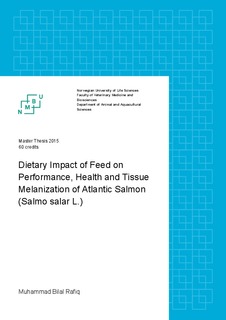| dc.description.abstract | Good performance, robustness to diseases and stress, and flesh quality according to consumer
expectations are important success factor in farming of Atlantic salmon (Salmo salar L). In recent
years, superficial hyper-pigmented “black spots” are the major fillet quality problem that causes
severe economic losses to the salmon industry. The aim of current research thesis was to
investigate the effect of diet on black spots, robustness to stress, health parameters and product
yield. Diets offered during the research trail were either a standard commercial salmon feed or the
same feed supplemented with antioxidants (vitamin-E and selenium), copper or zinc. The
experiment was conducted in seawater in triplicate net pens per dietary treatment from of June to
September 2014. Harvesting was done either by a standard method or after crowding stress. The
zinc group showed significantly higher body weight (4067 ± 60 g vs 3797 ± 53 g), body length
(69 ± 0.3 cm vs 67.7 ± 0.3 cm), fillet weight (2607 ± 40 g vs 2394 ± 35 g) and fillet yield (64.1 ±
0.1 % vs 63.2 ± 0.2 %), and lower melanization of the peritoneum. The antioxidant group showed
lower melanization of skeletal muscle and the zinc group also tended to have lower degree of
melanization. The copper supplementation showed no significant effect, but a tendency to higher
incidence of dark pigmented spots. Light microscopy of the melanized tissue samples revealed
aggregation of mononuclear, pigmented cells or darkly stained particles inside the cells
surrounding the tissues. It is concluded from the current study trail that supplementation of zinc
increases growth performance and improves fillet yield. The antioxidant supplementation
improves health status with lowest incidence of pigmented spots. | nb_NO |
